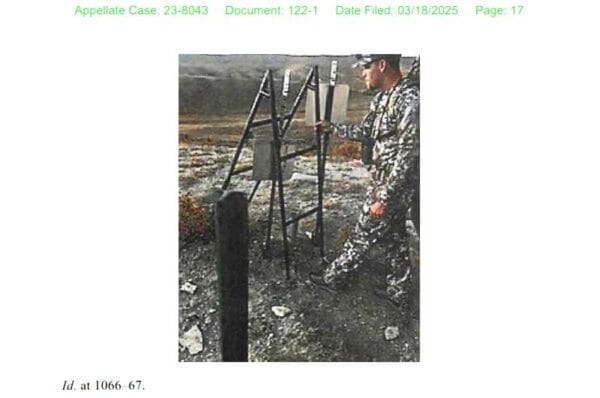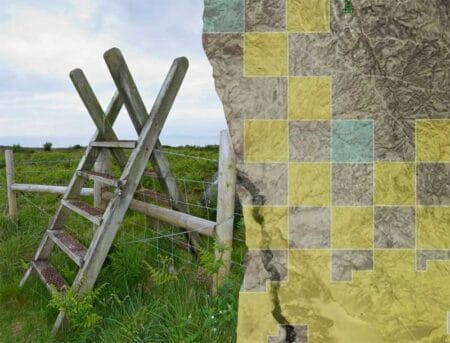
In a major win for public land users, a federal appeals court has delivered a long-awaited decision protecting the right to access “corner-locked” public lands across the American West. The U.S. Court of Appeals for the 10th Circuit ruled that hunters who used a ladder to cross between public land parcels—without touching the private land in between—did not trespass.
The decision applies to six western states under the court’s jurisdiction: Wyoming, Colorado, Utah, New Mexico, Kansas, and Oklahoma.
It immediately opens the door—literally and legally—to more than 3 million acres of public land that were previously out of reach due to old property boundaries that created a confusing checkerboard of public and private parcels.
A Win for the People, a Blow to Land Barons

The case stemmed from a 2021 elk hunting trip in Wyoming, where four hunters from Missouri used an A-frame ladder to cross from one square of public land to another. This crossing happened precisely at the corners—think of a chessboard where black and white squares touch only at the tips.
The private landowner, Fred Eshelman, a wealthy pharmaceutical executive from North Carolina, owns the massive Elk Mountain Ranch that surrounds the public land at issue. He sued the hunters for $9 million, claiming the crossing diminished his property’s value. But the 10th Circuit wasn’t buying it.
Judge Timothy Tymkovich, writing for the unanimous three-judge panel, ruled that blocking access to public land through legal threats, fences, or even lawsuits is exactly the kind of “unlawful inclosure” Congress banned in 1885 to stop cattle barons from hoarding land for themselves.
“This case touches on the heart of the American West and the centuries-old tension between private ownership and public access,” Tymkovich wrote.
What the Ruling Means
This isn’t about sneaking across someone’s front yard—it’s about stepping over invisible corners between legally accessible public lands, often to hunt, hike, or explore. In the decision, the court ruled that as long as someone doesn’t physically touch private land or cause damage, crossing at these corners is not trespassing.
In plain terms: if you can drop a GPS pin on the actual corner and step cleanly from public land to public land, you’re within your rights.
However, the ruling only covers the 10th Circuit. That means hunters in other western states like Montana, Nevada, and Idaho, that are stuck in the liberal 9th Circut Court, will still have to proceed with caution until similar rulings or legislation are passed.
You Still Need to Be Smart About It
Legal doesn’t mean easy. GPS signals can be off by several feet, and corner markers can be buried, missing, or hard to find. Touching a private fence, stepping a few inches onto private ground, or causing damage could still land someone in hot water.
Backcountry Hunters & Anglers, and other conservation groups celebrated the ruling but emphasized the importance of ethics, precision, and respect for landowners. “This isn’t a green light to be reckless—it’s a signal that the public has rights, too,” said BHA attorney Eric Hanson, who filed an amicus brief supporting the hunters.
Final Word
This decision is a rare moment of clarity in the murky world of land use law—and a strong statement in favor of everyday Americans’ right to enjoy public lands that belong to them. As digital mapping tools like onX Hunt Premium App improve and awareness grows, this case could mark the beginning of a broader movement to open access to the millions of public acres that have been landlocked by powerful private interests for over a century.
If you’re headed into the backcountry, know your rights, but respect the land—and those who own the parcels next door.



there should be an easement that is present always, in of all places massachusetts native peoples have the right to cross privet property while hunting or fishing, likely a leftover from pilgrims agreements defiantly not progressive , show respect get respect……..
A “Right of Access” is the only way I can get to my home in North Georgia, where I have to cross 17 privately owned properties to get to mine. Only 1 owner of the 17 would actually block me if he could, but without this law in Georgia I would have to buy a helicopter. (Of course I’d fly right over that guy’s house if that WAS the case.)
A Right of Access should be universal, and should apply to publicly-owned property as well as privately-owned.
A-holes like the plaintiff in this case should have a several acre swath condemned and transferred to public domains to ensure no one ventures on his precious land.
The way I see it is you have these multi millionaire from NYC , New Jersey, commiefornia , and the Chinese government buying up tens of thousands of acres of ranch land in Wyoming . They block off access to any BLM land. The only way they will allow access to the BLM land is by charging hunters $1000 to cross their property. When hunters use corner crossing, this angers these land owners because they aren’t getting their $1,000. Ridiculous claims by these land owners that by simply putting your boot or finger on their land, that causes the land… Read more »
“He sued the hunters for $9 million”
That alone is just ludicrous, IF he’d chosen a more “realistic” figure, say $100,000, he may have one, but $9 million, what a clown…
The fact that the land it broken up like a checkerboard is ridiculous already. Add on that landowners believe they own the land into the sky to infinity is preposterous. Most hunters/hikers practice Leave No Trace & would be respectful of private land. Are there bad apples? Yes. On BOTH sides! Definite win for public landowners. That’s all of us!
This is great news for hunters in those states!
On my acreage there is 5.5 acres land locked which belongs to my neighbor. I am required to provide him access but I designate how he gets that access, in and out. When selling walnut trees to a contractor, I advised my neighbor and he too agreed to sell. I offered for him to bring his cut logs out and stage for pickup on my land. He was so appreciative, today I am the only one allowed to hunt not only the 5.5 acres, but his 50 across the creek. The private land owner in the article missed a great… Read more »